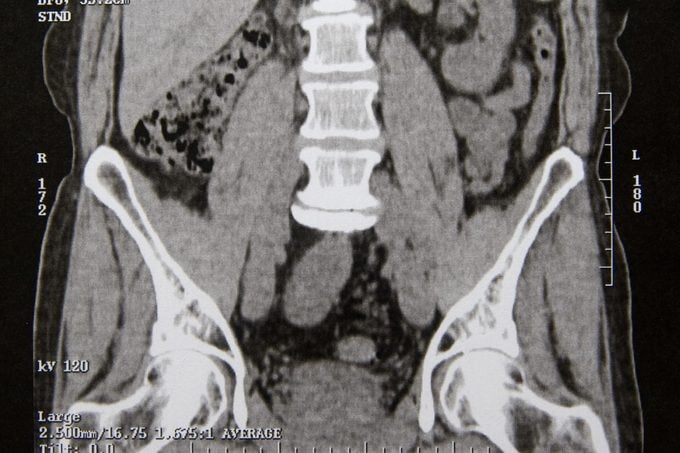This Is How Long It Takes to Pass a Kidney Stone
Updated: Aug. 19, 2020
Kidney stones can happen to anyone. Here's how long it may take to pass one.
Passing a kidney stone can be extremely painful and, in some cases, impossible without medical treatment like surgery. If you are passing a kidney stone, it would be great to know just how long you must endure the pain before it’s over. The short answer, however, is that it depends on a few specific factors.
How long does it take to pass a kidney stone?
On average, most people who pass a kidney stone do so in one to three weeks—if they pass at all, according to Jennifer Linehan, MD, urologist and associate professor of urologic oncology at the John Wayne Cancer Institute at Providence Saint John’s Health Center in Santa Monica, California. “Most times, you can simply wait for the stone to pass,” she says. At a max, four to six weeks for the stone to pass is safe as long as the pain is bearable, she adds. (Make sure you’re not making these 7 innocent mistakes that cause kidney problems.)
A kidney stone is not really a “stone” at all. “The term ‘kidney stone’ is a widely-used nickname to describe the calcifications consisting of the body’s excess minerals and salts that can build up inside the kidney,” says S. Adam Ramin, MD, urologist and medical director of Urology Cancer Specialists in Los Angeles. “As these substances accumulate in the kidney and begin to harden, they begin to form a crystal.” When multiple crystals accumulate and join together, there’s a pebble-like formation: a kidney stone.
The size and type of kidney stone matters
There are a few different types of kidney stones, too. Most are calcium stones which are due to an excess of calcium oxalate, says Dr. Ramin. This compound is found in some foods and is a waste product your body makes. High amounts of sodium, vitamin D, and dehydration are also major contributors to these types of kidney stones, according to Dr. Ramin. Other examples include uric acid, struvite, and cystine stones, but these only make up anywhere from 1 to 10 percent of kidney stones.
Whether or not you can pass any of these types of stones mainly depends on the size and location of the stone in the urinary tract. “Stones that are less than four millimeters have a 75 percent [rate] of passing, of course, that may still be with discomfort,” Dr. Linehan says. “As the stones get larger than four millimeters then [the] chance of passing gets less.” Stones greater than six millimeters only have a 35 percent chance of passing without intervention.
 Kidney stone removal is only necessary in extreme cases
Kidney stone removal is only necessary in extreme cases
Removing a kidney stone is unnecessary for other people—and some never even know they have one. “Small stones in the kidney may be left alone if they are not causing pain or infection,” Dr. Linehan says. A few people choose to have these small stones removed because they’re afraid of any potential pain from passing them in the future. Surgery is necessary if the stones put your kidneys in trouble and cause repeated infections in the urine or are completely blocking the flow of urine from the kidney. Otherwise, your pain level determines if surgery or other methods like shockwave therapy are necessary.
How to pass a kidney stone
There are a few things you can do to make the pain of passing a kidney stone more bearable, according to Dr. Linehan. Pain medication, anti-nausea medication, and Flomax make moving a kidney stone easier. On the preventative side, Dr. Ramin recommends drinking more water and eating less salt. “My recommendation is to drink at least three liters of water every day, which is about ten 10oz glasses,” he says. “Doing this will help to dissolve any excess toxins or chemicals that build up before they can form into crystals or stones.” Dr. Ramin also recommends eating less meat or animal protein and less oxalate-rich foods such as coffee, chocolate, and soy products, too.
Talk with your doctor about your options for passing a kidney stone. Inform them of any pain so you can find the best course of action for you. While you’re there, don’t forget to ask your doctor these other questions.



